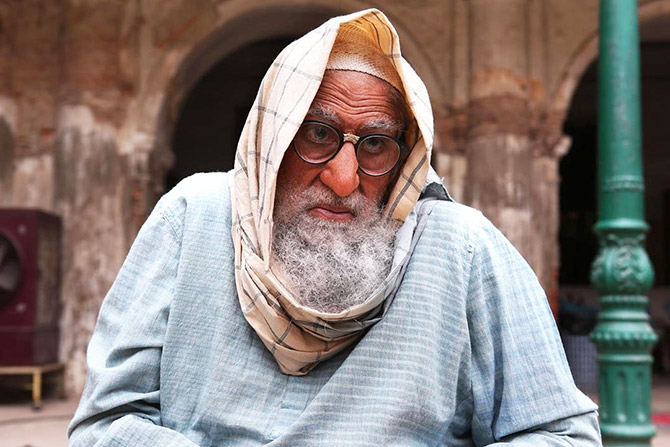By Rachit Raj
Right from the beginning, Gulabo Sitabo is a strange film. It sucks you in the dusty, breathing ruins of Fatima Mahal and makes you a part of the world of Mirza (Amitabh Bachchan) and Baankey (Ayushmann Khurrana), but also makes you restless quite early in the narrative with its cyclic, repetitive form of writing. You do not particularly care for either of them in those early minutes like you did for Vicky (Ayushmann Khurrana), Piku (Deepika Padukone), or Dan (Varun Dhawan).
There is something about them that does not fit, something that feels amiss. Mirza’s look reminds of a rare film where Bachchan collapsed as an actor, Khurrana, devoid of his regular arc, feels edging towards over the top acting, and for a second there you wonder if the winning combination of Juhi Chaturvedi and Shoojit Sircar has finally collapsed. It is a prospect that feels more real as scene after scene there is a tired absence of novelty once the initial couple of minutes’ banter passes by. Everything you saw in the trailer is here, and it all seems to be falling flat. But just when the film convinces you of its mediocrity, despite all the names attached to it, it rises in its second hour to become the kind of film you associate with Sircar and Chaturvedi.
The story is a simple one. It is a cat-and-mouse banter between Mirza, the landlord and Baankey, heading an army of tenants who refuse to increase the laughably low rent that they pay for staying at Fatima Haveli. They are both decidedly unlikeable characters. The narrative makes it impossible for us to pick a side because they are both so magnanimously unpleasant. The humour is not laugh-out-loud, but more reflective. Like the walls of the haveli that are old and on the verge of collapsing, the narrative of Gulabo Sitabo finds feet in its simplistic, repeatable moments that make you smile despite a strong aversion to its central characters.
The charm comes from the side actors: a terrific Farrukh Jaffar as Begum, Vijay Raaz as an officer of the archaeological department, Brijendra Kala as a lawyer, and Srishti Shrivastava as Guddu, Baankey’s intelligent, composed sister. These characters form the core of the film, despite Mirza and Baankey owning much of the screen time. The film works best when it becomes a commentary on how the machinery manipulates people. The symbolic absence of intelligence in both Mirza and Baankey is reflective of the common public, and how officials make use of conflicts to find the best bite of the pie for themselves.
The joke is not on Mirza and Baankey alone, but also on the audience, who is being fooled into a narrative where the attention remains on the two men constantly. The real story of Gulabo Sitabo probably has Mirza and Baankey as side comic characters, but the film reveals its card late. For some, it might be too late, and the squibbing hate and an aimless-looking a little too dragged to make anything worthwhile, but if you continue to notice the little details, the final few minutes of the film provide an arc, an essence of the futility of the banter that defined the film for the longest of times.
Juhi Chaturvedi writes her most inferior screenplay here, but even in that, there is a kind of intelligent softness that is rare to find these days. The entire film is a massive act of deceit, and it makes sense why Bachchan has been given a beard so thick that it covers the entire screen and Khurrana given lines that are so loud and clear that we fail to hear the noises that truly matter in the context of the film’s real narrative.
The film hinges more on the actors than previous Chaturvedi-Sircar movies. It is imperative that Bachchan and Khurrana work, and thankfully they do for the most part. Bachchan nails the nihilistic, greedy old man role, and Khurrana eases into a desperate, vulnerable but arrogant nobody. He is especially good in scenes where he is forced to accept his economic and social standing by women who surround him, constantly challenging his patriarchal authority over him by proving that they understand the world better.
Gulabo Sitabo is a film that needs patience. It is not a film that will grip you right from the beginning, but it is worth a journey. As mentioned at the beginning, this is a strange, almost absurd film. It says a lot about the world we live in, without becoming loud about it. The last leg of the film is probably the most satisfying one. It grabs the melancholy better than it does the comedy and leaves us with a film that probably needs time to accept for everything it did.
Now streaming on Amazon Prime Video
[Read more of the author’s work on his blog here]







Leave A Comment
You must be logged in to post a comment.